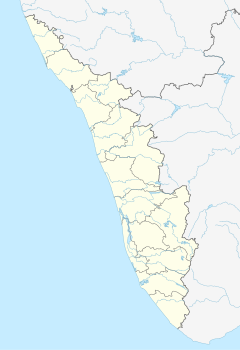Achankovil Sastha Temple

| Achankovil Sree Dharmasastha Temple | |
|---|---|
 The Temple in 2011 | |
| Religion | |
| Affiliation | Hinduism |
| District | Kollam |
| Deity | Shasta |
| Festivals |
|
| Governing body | Travancore Devaswom Board |
| Location | |
| Location | Achankovil |
| State | Kerala |
| Country | India |
| Geographic coordinates | 9°05′30″N 77°07′17″E / 9.09167°N 77.12139°E |
| Architecture | |
| Type | Dravidian architecture |
| Specifications | |
| Direction of façade | East |
| Elevation | 87 m (285 ft) |
The Achankovil Sastha Temple is a Hindu temple located near the banks of the Achankovil River in the Kollam district in the Indian state of Kerala. It is one of the five important temples dedicated to Shasta in Kerala, the others being Kulathupuzha, Aryankavu, Sabarimala and Kanthamala.[1] The idol in the temple is believed to have been consecrated by Parashurama.[2] The temple is known for curing poisonous snakebites. The Travancore Devaswom Board administers the temple.[3]
Location
[edit]The temple is located near the banks of the river Achankovil.[4] It is situated in the panchayat of Aryankavu in the Kollam district of Kerala.[1] The temple is situated about 50 km (31 mi) from Punalur and 85 km (53 mi) from Kollam.
Deities
[edit]

The principal deity of the temple is Shasta.[5] He is locally known as "Achankovil Andavan" or "Achankovil Arasan".[4][6] Shasta is depicted as a Gṛhastha (householder), along with his two consorts, Purna and Pushkala, on either side.[7]
Bhagavati, Maalikapurathamma, Durga, Nagaraja, Nagayakshi, Ganesha, Kartikeya, Karuppu Sami, Karuppayi Amma, Cheppanimundan, Chappanimaadan, Madanthevan, Kalamadan, Kochattinarayanan, Singali Bhootathan and Arukola are the subordinate deities.[8] The back portion of the temple has a Sarpa Kavu, where Naga is worshipped.[8]
Snakebite treatment
[edit]Achankovil temple is known for curing poisonous snakebites,[7] and the deity is considered a Maha Vaidya (great physician).[9] The right palm of the Shasta idol holds Chandanam (sandalwood paste) and Theertham (holy water), which according to the devotees have medicinal properties.[10] This is one of the rare temples that opens at night if necessary after the Athazha Puja. Those who get bitten by snakes can call for help at any time by ringing the temple bell, and the temple priests will help them.[11][7] The person bitten by the snake is given sandalwood paste as prasadam and medicine and needs to stay at the temple for three or five days, depending on the severity of the poison.[8]
Festivals
[edit]The Mandala Puja is one of the important festivals in the temple. It is held every year from the first to the tenth day of the Malayalam month of Dhanu (December–January).[2] Revathi Puja is another main festival hosted in the Malayalam month of Makaram (January–February). The temple is also one of the important temples in Kerala to conduct the Therottam (chariot festival).[11] Karuppanoottu and Karuppanthullal are the major attractions during the festival time. The festivals and rituals have similarity to the Tamil traditions.[6]
See also
[edit]References
[edit]- ^ a b Infokerala Communications Pvt. Ltd. (September 2019). "Kollam District Temples". Pilgrimage to Temple Heritage 2019 (11th ed.). Info Kerala Communications Pvt Ltd. p. 84. ISBN 9788193456781.
- ^ a b "Achankovil Shastha Temple | Sabarimala". sabarimala.kerala.gov.in. Archived from the original on 8 August 2023. Retrieved 9 October 2023.
- ^ Vidyanandan, MS (18 January 2016). "5 Temples Part of Sabarimala Pilgrimage Circuit". The New Indian Express. Archived from the original on 5 October 2023. Retrieved 4 October 2023.
- ^ a b Pereira, Ignatius (18 December 2013). "The mountain trails of a divine legend". The Hindu. ISSN 0971-751X. Archived from the original on 17 May 2023. Retrieved 9 October 2023.
- ^ Kumar, R. Sanjeev (16 January 2019). "ശാസ്താവിന്റെ ആറ് വിശിഷ്ട ക്ഷേത്രങ്ങളും ദർശനഫലവും". ManoramaOnline (in Malayalam). Archived from the original on 22 November 2022. Retrieved 9 October 2023.
- ^ a b Rajappan, T. K. (15 November 2018). "കാട്ടിൽ മറഞ്ഞ കാന്തമല; അദ്ഭുതങ്ങളുടെ ആ അഞ്ച് ക്ഷേത്രം". ManoramaOnline (in Malayalam). Archived from the original on 22 November 2022. Retrieved 9 October 2023.
- ^ a b c Joseph, Sinu (2 December 2019). "Achankovil Sree Dharmasastha Temple–Swadisthana Chakra". Women and Sabarimala: The Science behind Restrictions. India: Notion Press. ISBN 9781647336349.
- ^ a b c Ramkumar, V. (September 2002). ശാസ്താക്ഷേത്രങ്ങൾ [Shasta Temples]. In Nair, Paramasivan (ed.). Sri Ayyappan (in Malayalam). India: Siso Books. p. 225. ISBN 9788177970333.
- ^ Sirdesai, Narayan (26 June 2019). "Shakti Cults – Esoteric Hinduism". The Secret of Sabarimala Temple and Kundalini. Notion Press. ISBN 9781684668229.
- ^ Sarma, S.A.S. (27 March 2015). "Medical treatments described in the ritual texts of Kerala: interaction between religion and science". In Keul, István (ed.). Asian Religions, Technology and Science. Taylor & Francis. p. 146. ISBN 9781317674481.
- ^ a b P. Ananthan, Anukumar (11 July 2022). ശ്രീധർമ്മശാസ്താവ് [Sree Dharmasastha]. Manimandapavum Thankadwajavum (in Malayalam). Blue Rose Publishers. p. 22.

